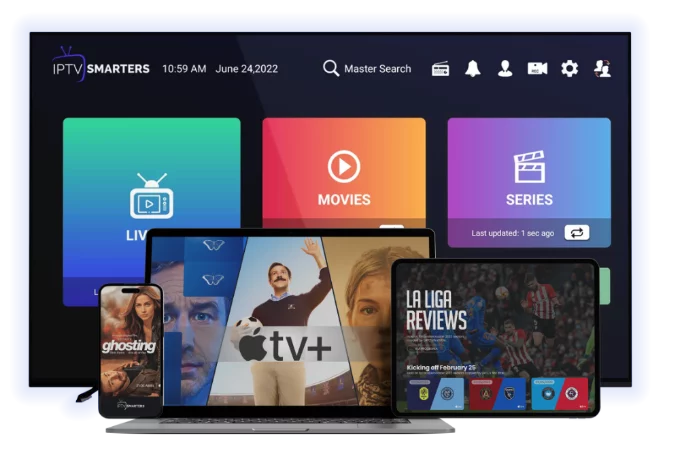What Is IPTV and How Does It Work? iptvfree24
July 24, 2025
IPTV stands for Internet Protocol Television. Unlike traditional cable or satellite TV that transmits signals through physical means, IPTV delivers television content via the internet. As long as you have a stable internet connection and a compatible device, you can access live channels, on-demand videos, and other multimedia services.
2. How IPTV Works
Instead of receiving signals through satellites or broadcast towers, IPTV works by sending video content in data packets over the internet. These packets are transmitted from the IPTV provider's server and decoded by the IPTV application installed on your device.
The entire process is similar to how you stream videos on YouTube or Netflix—except IPTV often offers a much broader range of live and international channels.
3. Types of IPTV Services
There are three main categories of IPTV:
- Live Television: Streaming of current TV broadcasts in real time.
- Video on Demand (VOD): Choose from a library of movies or series and watch them any time.
- Time-shifted TV: Lets you replay shows that aired earlier (like a rewind feature).
4. Devices You Can Use to Watch IPTV
You can stream IPTV on a variety of devices, including:
- Smart TVs (Samsung, LG, Android TV)
- Smartphones and tablets
- Desktop computers and laptops
- Streaming devices like Fire Stick, Roku, and Apple TV
- Dedicated IPTV set-top boxes
5. IPTV Formats and Protocols
IPTV uses specific formats and protocols for delivering content:
- M3U playlists: The most common format containing channel streams.
- Xtream Codes API: Used to log in and load content dynamically.
- HTTP Live Streaming (HLS) and RTSP: Streaming protocols used for smooth delivery and playback.
6. Pros and Cons of IPTV
Pros:
- Access to thousands of channels and VOD
- Stream from anywhere with internet
- Cheaper than cable subscriptions
Cons:
- Quality depends on internet speed
- Some services may be illegal or unreliable
- Buffering issues without proper setup
7. Is IPTV Right for You?
If you're looking for an affordable, customizable, and flexible way to watch TV, IPTV might be the perfect choice. It offers a massive variety of content, works on most devices, and eliminates the need for bulky hardware.
However, always choose legal and reliable providers to ensure smooth performance and avoid legal issues.
Latest Post
IPTV Security Guide: Protect Your Streaming in 2025
October 3, 2025
Best IPTV Apps and Players in 2025: Ultimate Guide
October 3, 2025
Complete Guide to IPTV Parental Controls
October 3, 2025
Ultimate IPTV Channel Guide: Everything You Need to Know
October 3, 2025
Future of Television: How IPTV is Changing Entertainment
October 3, 2025
IPTV for Sports Fans: Getting the Best Live Sports Experience
October 3, 2025
Top 10 Benefits of Using an IPTV Service
October 3, 2025
How to Choose the Right IPTV Subscription: Features to Look For
October 3, 2025
IPTV vs Cable TV: Which Is Better in 2024?
July 20, 2025
How to Install IPTV on Smart TVs
July 22, 2025
Common IPTV Problems and How to Fix Them
July 25, 2025
Why Your IPTV Is Buffering (And How to Fix It)
July 27, 2025
How to Use a VPN with IPTV for Privacy & Access
July 28, 2025
IPTV for Business: Complete Setup Guide 2025
October 3, 2025
Ultimate Guide to 4K IPTV Streaming
October 3, 2025
IPTV and Smart Home Integration Guide
October 3, 2025
IPTV for Gamers: Streaming & Gaming Setup Guide
October 3, 2025
Ultimate Guide to Mobile IPTV Streaming
October 3, 2025
Complete Guide to IPTV Recording and DVR
October 3, 2025
IPTV Audio Setup: Ultimate Sound Guide
October 3, 2025
Family IPTV Sharing: Complete Setup Guide
October 3, 2025
IPTV While Traveling: Complete Guide
October 3, 2025
Internet Requirements for IPTV: Complete Guide
October 3, 2025
IPTV on Different Smart TV Brands: Comparison Guide
October 3, 2025
Master Guide to IPTV Troubleshooting
October 3, 2025
Cutting-Edge IPTV Features Coming in 2026
October 3, 2025
Ultimate Guide to Saving Money with IPTV
October 3, 2025
Is IPTV Illegal in USA? The Truth Explained
July 29, 2025
Is IPTV Illegal in USA? Myths vs. Facts
July 31, 2025
IPTV for Beginners: Complete Guide 2025
October 4, 2025
Top 10 IPTV Providers in 2025: Comprehensive Review
October 5, 2025
IPTV Internet Speed Requirements: Complete Guide 2025
October 6, 2025
IPTV Legal Guide: Staying Compliant in 2025
October 7, 2025
Multi-Room IPTV Setup: Complete Guide 2025
October 8, 2025
IPTV Video on Demand: Ultimate Guide 2025
October 9, 2025
IPTV EPG Setup: Complete Electronic Program Guide Guide
October 10, 2025
IPTV Recording & DVR: Complete Setup Guide 2025
October 11, 2025
IPTV App Comparison: Top Players Reviewed 2025
October 12, 2025
IPTV Sports Packages: Complete Guide 2025
October 13, 2025
IPTV International Content: Global Guide 2025
October 14, 2025
IPTV Device Compatibility: Complete Guide 2025
October 15, 2025
IPTV Weather & Outage Guide: Staying Connected
October 16, 2025
IPTV Data Usage: Complete Management Guide 2025
October 17, 2025
IPTV Future Trends: What to Expect in 2026
October 18, 2025
IPTV Accessibility Features: Complete Guide 2025
October 19, 2025
IPTV Backup Solutions: Complete Redundancy Guide
October 20, 2025
IPTV Community Features: Social Streaming Guide
October 21, 2025
IPTV Quality Optimization: Ultimate Guide 2025
October 22, 2025
IPTV Cost Analysis: Complete Financial Guide 2025
October 23, 2025
IPTV Setup Checklist: Complete Implementation Guide
October 24, 2025
IPTV News Coverage: Complete Guide 2025
October 25, 2025
IPTV Kids Content: Family-Friendly Guide 2025
October 26, 2025
